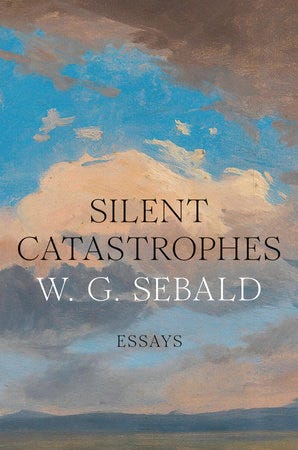Who Will Review the Books?
Me along with some people from Ohio, apparently
A Forthcoming Sebald Essay
I’m in the midst of a few strenuous writing and publishing projects at the moment. The first is a review of Silent Catastrophes, a newly translated essay collection by W.G. Sebald. It collects his criticism of Austrian literature, covering figures like Adalbert Stifter, Franz Kafka, Thomas Bernhard, and Peter Handke, among others. The essays are straightforwardly academic and predate Sebald’s published novels and short stories, but they still partake in his characteristic melancholy atmosphere and ruminative approach to questions of suffering and historical guilt. I could go on, but the kind editors of The Cleveland Review of Books, the journal set to publish my review, might want me to save the salient points for them.
I should also mention that The Cleveland Review of Books is moving to a paid subscriber model. You would do well to support them. I’m an interested party, of course, but I think the CRB publishes some of the best literary criticism that can be had, and about books that would receive little to no coverage otherwise. They’ve been generous to Paradise Editions, reviewing the first book published through the press, Jaroslav Hašek’s The Man Without a Transit Pass. Mind you, this review happened not because I am especially well-connected or have capital to spend on advertising and promotion; quite the opposite. It’s because the CRB allows their reviewers to cover the books that interest them, unbound by (often incorrect) editorial assumptions about what readers care about.
The CRB is one of a vanishingly small number of professional outlets that review books outside the major corporate publishers and big independent presses, that will review books that are more than a few months old. Even with those advantages, it can be very hard to place a review. No other outlet besides the CRB even responded to my pitches. I would expect that sort of treatment for an essay about Jean Paul, an essay about Wolfgang Hilbig even. But Sebald is not some obscure figure. Along with Roberto Bolaño and David Foster Wallace, he’s among the very few (it’s always very few, in any era) contemporary writers who stand a chance of being canonized, of being read hundreds of years down the line. Why wouldn’t you want to cover him? It’s baffling.
The second project is the imminent printing and distribution of Israel Bonilla’s Phoretics, which I’ve written about elsewhere. Through typesetting and proofing, I’ve come to realize that Phoretics is long enough to make a short, conventionally bound pocket paperback, which is what I’m working on next. I’m happy I can act on that knowledge. In the days before e-commerce, layout software, and print-on-demand, such changes would have been prohibitively expensive, even for a much larger publishing outfit than mine. It has never been easier to experiment with different approaches to print. We move from mistake to mistake, almost but never quite arriving at any sort of ideal. I might gripe about it, but on a purely artistic and intellectual level, small—or rather micro—press publishing has enriched and improved my experience of writing. I’ll keep telling myself that at least. Whether being a publisher has resulted in any outward improvement in my writing, that I leave for you, kind reader, to decide.
On Intent in Writing and Publishing
Dave C. Porter has published an excellent essay about his new journal Keep Planning, which recently published two short prose pieces of mine. If you are bored and frustrated by online literature, or just plain indifferent, I recommend that you read Dave’s essay. He gives some compelling reasons why that might be the case. Chief among them is a lack of clear purpose. “A great deal of these venues seem to exist for no reason in particular.” Where this clear reason is lacking, you’ll find the usual platitudes about “fostering community” and “centering marginalized voices” paired alongside, without apparent irony, onerous submission fees and response times of half a year or more. Worse still are the twee calls to action, stuff like: “Give us your work and revolutionize the world. Make your own destiny. Rewrite the stars.” None of this communicates, none of this differentiates, and none of this should be unfamiliar to anyone who’s spent more than a cursory time in online literary spaces.
The key difference is that Dave did something about it, and not in the self-righteous sense that usually accompanies that phrase in America. The assumption is always that “doing something” is unambiguously good, always preferable over critique, always preferable over ambient discontent. No. We are inundated with cubic yards of bullshit every day and then told that we have to shovel it. No, we shouldn’t always “do something”, shouldn’t always pile on the bullshit. Newsletters and literary magazines multiply, small presses multiply, but many of them are not worth the electricity used to run their websites or worth that strange plasticized cardstock used for book covers. We already have the minimum viable product a hundred and a thousand times over.
I don’t mean to praise what Dave is doing as “necessary” or “savvy” or as—this is my personal favorite—“a sorely needed corrective”. What I do find actually necessary, and where Keep Planning succeeds, is being published alongside writers that I want to read. This means a short story by B.R. Yeager, or some poems by Ty Holter. Writers I like and know. Or it means a story by Amelia C. Winter, a writer I didn’t know about until now. This is sufficient “literary community”, at least for me. I’ve gotten by on a lot less.



